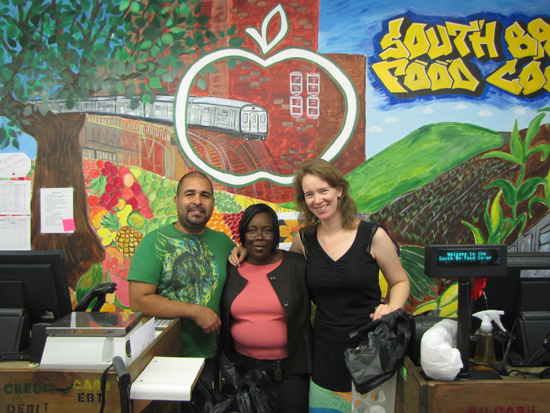Members insist food justice fight hasn’t ended

When the South Bronx Food Co-op formed in 2007, it was hailed as a watershed in bringing nutritious, organic, and locally-grown food to a densely-populated Bronx neighborhood starved for fresh produce.
But the project that began with great hope and fanfare has run aground. Its storefront on Third Avenue and E. 158th Street is closed and is not likely to reopen. Its entire inventory has been sold.
While members insist the co-op will not disband, without a store, the group must search for another way to fulfill its mission.
A combination of economic issues, internal politics and high overhead made the store insolvent, according to remaining members of the co-op.
“We really have to think long and hard. Is this really the best for the co-op to close? Have we exhausted every solution?’” asked Board President Ed Garcia Conde. “Just the response that we got from the community was really heartwarming.”
He said one customer, who shopped at the store after church, took one of the workers to the back to pray when she heard of its troubles.
The store had developed a solid reputation. Offering more than just food for sale, the co-op also hosted cooking classes, yoga sessions and nutrition courses. In fact, even as the financial troubles began, in July the city named the South Bronx Food Co-Op the Bronx Small Business of the Year.
The fundamental problem, members say, was a membership base that was too small. The South Bronx Co-Op has approximately 260 members. By contrast, the Park Slope Co-Op in Brooklyn, the city’s largest, claims over 12,000 members. Lacking a sustainable membership base, the co-op needed walk-in trade. It didn’t get enough.
The idea that members would exchange their labor for lower prices was fundamental to the co-op, but in the absence of volunteers, labor shortages frequently forced the store to close, which made things worse.
Garcia Conde said the co-op began to founder last spring when it got behind on the rent. The landlord has been reasonable, according to Garcia Conde. “If he didn’t believe in us, he could have thrown us out of here a long time ago,” he said. But months of unpaid rent have been adding up.
The co-op tried to save itself by renting part of its space to SoBRO, the South Bronx Overall Economic Corporation, which needed a place to store Green Carts, the carts street vendors use to sell produce in a city program aimed at providing more fruits and vegetables.
By some accounts, an agreement could have paid half of the co-op’s monthly rent, but the landlord, worried about how the space would look and whether the carts would attract vermin, rejected the plan.
There have been other issues. While a large storefront can be a boon to retailers, the 1,400 square-foot store was too big to keep the co-op looking well-stocked. In October, Member Robin Dixon said even though the co-op had just spent $2,000 on merchandise, the store still looked empty.
“Even if we spent a natural amount of money to fill it up, it’ll still look empty,” she said. “And the bigger the space, the more you have to put out to draw people in.”
While the store has previously received grants to pay employees, members say the main mission of the store was to be sustainable without external funding.
Shifting internal politics have complicated the issue. Amid board disputes, founding member and former executive director Zena Nelson was ousted in April.
Despite the clash, Nelson said she’s still optimistic about bringing fresh food to the Bronx.
“The most important thing at heart is that it was an intrinsically successful attempt to increase healthy food in a community that not only needed it, but does want it,” she said.
The remaining members agree that the co-op is still a meeting ground for food justice and neighborhood activists. Dixon added that people are still devoted to the project.
“I’m hopeful,” said Dixon, “because when I came into the co-op I committed myself. I’m not going to turn my back because things are not going well, because that’s not a person that’s committed. If we’re committed members, we have to see it all the way through the end when there’s nothing.”
She, John Reynolds and a number of others are in the early stages of starting a new co-op, Dixon said, and finding a store in a new location, possibly closer to the more heavily trafficked Hub. This proposed co-op would model itself more on the Park Slope model, allowing only members to shop.
Reynolds said he plans to present a proposal to the New York Academy of Medicine at a symposium next month.
Members say even if the store closing is disappointing, they see no reason to stop working to spread food rights issues.
“Its even more of a reason for us to keep fighting to stay alive,” Garcia Conde said.

[…] and E. 158th Street is closed and is not likely to reopen. Its entire inventory has been sold (Mott Haven Herald). […]
[…] South Bronx Food Co-op Closes Its Doors December 14, 2010 (Quoted) […]